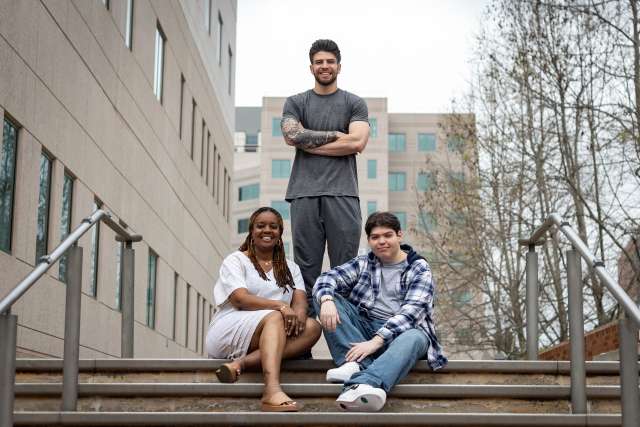Researchers at UCLA have been searching for the cause of a rare disease that virtually no one has ever heard: PCH1, or pontocerebellar hypoplasia type 1, which attacks the brain and the spine.
It's a particularly cruel disorder, occurring mostly in infants, who begin manifesting symptoms at or soon after birth, with poor muscle tone, difficulty feeding, growth retardation and global developmental delay.
Now, thanks to the cooperation of a California family stricken by the disorder and a state-of-the-art genomic sequencing lab at UCLA, Dr. Joanna Jen, a UCLA professor of neurology, and colleagues discovered a specific mutation of a gene that is responsible for PCH1 in this family, then confirmed mutations in the same gene in several other PCH1 families around the world.
The study appears in the April 29 in the online edition of the journal Nature Genetics.
The diagnosis of PCH1 is often delayed or never made because the combination of cerebellar and spinal motor-neuron degeneration is very rare and not commonly recognized. The discovery of the gene, EXOSC3 (exosome component 3), showed that it is critically important in the normal development and survival of neurons, especially in the cerebellum, and for motor neurons in the spine, which innervate or stimulate muscles.
Five years ago, Jen began working with a family living in Southern California with four boys who were neurologically afflicted. They were floppy at birth, suffered from progressive muscle wasting and were never able to stand, walk or speak. Today, they range in age from 9 to the teens, and none weighs more than 50 pounds.
The family was referred to Jen because of her special interest in rare neurological disorders. As Jen reviewed the medical history and examined the children to reach a clinical diagnosis, she began searching for the causative gene in collaboration with Dr. Stanley Nelson, a professor and vice chair of the UCLA Department of Human Genetics.
Nelson, who also directs the UCLA Clinical Genomics Center, and his graduate student Michael Yourshaw, used a new technique called exome sequencing. The exome is the part of the genome that directs those proteins that are actually expressed — that is, it provides the genetic blueprint for functional genes. Exome sequencing searches just the protein-coding regions in the genome to pinpoint disease-causing mutations. In this way, they were able to quickly survey some 22,000 protein-encoding genes to identify a defect in the EXOSC3 gene in this single California family.
To confirm their finding, Jen reached out to other neurologists around the world, eventually verifying the presence of the same defective gene in eight other families stricken with PCH1. And by using a model of the disease in zebrafish, Jijun Wan, a UCLA research scientist in neurology, found that preventing the EXOSC3 gene from expressing in zebrafish caused embryonic maldevelopment and poor movement reminiscent of human clinical features. These symptoms were largely reversed when the researchers injected normal EXOSC3, suggesting that it was indeed the mutations that disrupted normal function.
The EXOSC3 gene encodes a core component of the RNA exosome complex, which is essential for all organisms and which is emerging as the major cellular machinery in the processing of RNA to regulate gene expression, Jen said. There is increasing appreciation for the diversity of RNAs, she noted, as it is becoming clear that the majority of genomic information is transcribed into RNA.
"When we began this study, mutations in the RNA exosome had not been associated with any human disease," Jen said. "Relatively little is known about the human RNA exosome. It is surprising that a gene that is expressed in every cell should have such a selective detrimental impact on the cerebellar and spinal motor neurons.
There is increasing focus on RNA metabolism in motor neuron diseases such as amyotrophic lateral sclerosis (ALS), also known as Lou Gehrig's disease, and spinal muscular atrophy (SMA), the leading genetic cause of infant mortality, Jen said. The discovery of defects in the RNA exosome causing combined SMA and PCH further emphasizes the importance of the regulation of RNA metabolism.
"The discovery may lead to potential targets for treatment and in addition enhances our understanding of the biological function of the RNA exosome," said Jen. She is working with other neurologists to better define the clinical spectrum of EXOSC3-associated PCH1.
"It is remarkable that all of the affected children in this family have survived beyond infancy. We are grateful for the generosity of the family in sharing their experience and participating in research to improve the lives of other children who are similarly affected," said Jen.
There were multiple authors on the paper in addition to first authors Wan and Yourshaw, and Nelson and Jen. Please see the paper for names and affiliations. Multiple sources provided funding for the study, including the National Institutes of Health.
The Clinical Exome Sequencing Service within the recently established UCLA Clinical Genomics Center in the department of laboratory medicine and pathology provides fully CLIA-compliant whole-exome sequencing that can now be ordered on campus.
The UCLA Department of Neurology, with over 100 faculty members, encompasses more than 20 disease-related research programs, along with large clinical and teaching programs. These programs cover brain mapping and neuroimaging, movement disorders, Alzheimer's disease, multiple sclerosis, neurogenetics, nerve and muscle disorders, epilepsy, neuro-oncology, neurotology, neuropsychology, headaches and migraines, neurorehabilitation, and neurovascular disorders. The department ranks in the top two among its peers nationwide in National Institutes of Health funding.
For more news, visit the UCLA Newsroom and follow us on Twitter.



